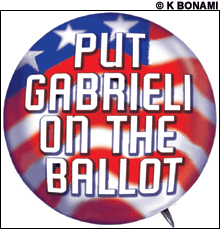Why Democrats should make a place for Chris Gabrieli. Plus, fixing the broken immigration system.
|

THE RIGHT CHOICE: Gabrieli is good on education, good on economic development, good on gay marriage
|
If the Democrats are serious about recapturing the governor’s office in November, they should make sure their statewide convention in Worcester this weekend puts Chris Gabrieli’s name on the ballot.
New party rules require that candidates receive 15 percent of the votes cast in a one-time vote — as opposed to the previous system allowing multiple ballots — in order to qualify for a slot in September’s primary election.
As of now, only Deval Patrick, a former US assistant attorney general for civil rights during the Clinton administration, is assured of a spot. Patrick bucked the conventional wisdom with his insurgent challenge to twice-elected state attorney general Thomas Reilly. He swept the February caucuses during which many of the delegates to the Worcester convention were chosen.
Since then, onetime front-runner Reilly has been fighting for his political life. With the support of would-be kingmakers like Boston mayor Thomas Menino and Senate president Robert Travaglini, Reilly is thought by political oddsmakers to be in a position to squeak through. It’s unclear, however, whether Reilly’s supporters are trying to lower expectations in an effort to dampen Gabrieli’s campaign to woo delegates or whether Reilly is still in fact in trouble. Whatever the answer, Gabrieli’s candidacy will inject even more drama into the Democrats’ already intriguing proceedings.
A son of immigrants and a Harvard graduate, Gabrieli is a self-made multimillionaire. A long-time party activist with a reputation for being something of a policy wonk, Gabrieli has twice before unsuccessfully run for office: first for the congressional seat ultimately captured by former Somerville mayor Michael Capuano, in 1998, and then as the running mate for Democratic gubernatorial-ticket leader Shannon O’Brien, in 2002.
ADVERTISEMENT
 |
Gabrieli entered the race not quite eight weeks ago, after he was unceremoniously squeezed aside as Reilly’s probable running mate by the AG’s disastrous decision to tap Dorchester state senator Marie St. Fleur as his number two. News of her past tax troubles instantly forced St. Fleur from the race and further wounded Reilly, who was already bleeding from his questionable intervention in a Worcester County drunk-driving case.
Reilly’s political ineptitude added luster to Patrick’s outsider campaign, which continued to gain momentum until Gabrieli entered the race. Patrick is by no means stalled, but Gabrieli has — at least for now — muffled Patrick’s thunder with a lightning campaign financed with an estimated $2.6 million of his own money.
The candidate to beat is most likely Lieutenant Governor Kerry Healy, the handpicked successor to Republican governor Mitt Romney, who — once elected — quickly turned his eyes toward a more glittering prize and is now an unannounced candidate for president. The idea of an independent candidate for governor is appealing in theory, but to date independent candidate Christy Mihos’s challenge to Healey does not suggest that he is ready or able to occupy the governor’s office.
With the jury still out — but not at all promising with regard to Mihos — it’s clear that any of the three Democrats would make a better governor than Healey. Reilly would be marginally better, but his ties to the business-as-usual Democratic clubhouse and his political ineptitude raise serious questions about his ability to beat Healey. Add to that the fact that in recent memory no attorney general — not even the admirable Frank Belotti (who lost the 1990 primary to John Silber) or the stalwart Scott Harshbarger (who lost the 1998 final election to Paul Cellucci) — has been able to make the leap into the governor’s chair, and the Democrats would do well to wonder why they think Reilly can.
There is no doubt that Patrick, an underprivileged kid from Chicago who won scholarships to Milton Academy and Harvard, showed guts and imagination by jumping into the race against what was once considered an unbeatable Reilly. And maybe it’s a sign of his shrewdness that this onetime underdog is waiting to capture his party’s top spot before he shows voters more of what he’s made of. But we don’t think we’re alone in thinking that he has squandered a political opportunity by allowing what should have been a plus with vote-tipping suburban-independent voters — his knowledge of how the private sector works — to be turned into a political liability. Reilly has made political hay out of Patrick’s board membership in a predatory finance company. And Patrick has been unconvincing — so far — in his efforts to paint himself as a corporate reformer, as opposed to a corporate seat warmer.
Is Gabrieli a better bet than Patrick? We’re not sure. But Gabrieli, who seems to be politically beholden to no one, is good on education, good on economic development, good on gay marriage, and he promises to attract first-rate talent to serve Massachusetts. His financially lucrative private-sector experience, unlike Governor Romney’s, created thousands of jobs, while his record of working to make government better by making it more thoughtful is second to none. And his willingness to sign on in the number-two spot in the ill-fated Shannon O’Brien campaign — as well as his further willingness to put his considerable personal fortune at the Democrats’ disposal in doing so — should silence soreheads who say he is trying to buy his way into the race.